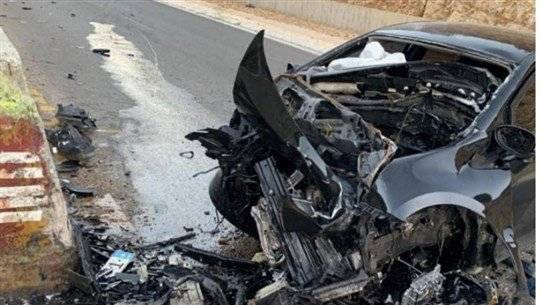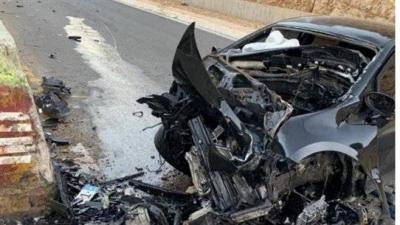Before George Rassi, Abu Jo, and Zeina Marabih, the mother of three girls, Naia, Yasmina, and Zeina, took their last breaths, an entire family of seven from the Feleiti family passed away after a truck carrying forty tons of stones struck several vehicles in the town of Arsal. Prior to them, in just one month, Ahmad Khodr, Ibrahim Jumaa, Reem Hassan Abdul Sattar, Charbel Makhlouf, Andrew Joseph Abi Hani, and many others became victims on roads in a country lacking any state structures. We mourned each one of them. We shed tears, and their families bled from grief. And what now? Do we light candles? We have done that. What next?
It is a new tragedy. Two new victims in the daily toll of road accidents in Lebanon, and may they not be the last. The departure of George Rassi - alongside Zeina Marabih - shook hearts, but the so-called men of state to whom we entrusted our affairs remained unfazed. Do we complain? It is futile. Talking to "walls" is of no use.
When Minister of Public Works Ali Hamieh was asked about road accidents, one of their causes being speed, he stated: "Speed is not within the Ministry of Public Works' jurisdiction." It is the easiest answer to one of the major causes of death in Lebanon. Today, during George Rassi's funeral, it was announced by the traffic control room that the last tally of road accidents (on the morning of Sunday, August 28) was horrifying: 5 dead, 12 injured, and 13 accidents. We awaken to fate.
Our fate is to be born here and suffer here, but honestly, very few can endure more. Nothing is more difficult than the element of surprise in death matters. It is the right of the people to ask: Is it true that all drivers in Lebanon have become potential corpses? Samir Snoo, the activities coordinator of YASA in Beirut, talks about 1000 victims annually on Lebanese roads and states, "The factors of death on the roads are numerous, and their common denominator is the state abandoning its responsibility."
Lawsuit Against the State
Is our state incapable, poor, or wicked, neglecting its duties? No, there's no need to think twice. Our state is a killer. It is responsible for many, many accidents and unnecessary deaths. Each time we enter a pitch-black tunnel, we remember that. We enter without knowing if we will emerge alive and unscathed.
In the United Arab Emirates, specifically Abu Dhabi, they caught a Lebanese man enjoying a pear while driving, and the fine was 800 dirhams (about $250), with 500 points deducted from his driving license. They even sent him a video detailing the dangers of eating while driving. Should we laugh or cry? There is a state there, and here they boast about a mini-state while forgetting they have obligations beyond merely weeping and pretending to be poor.
Some ask, what is the state's fault in every little thing? Its fault, dear world, is that it is the state. Isn't that enough? Lawyer Ashraf Al-Moussawi is the legal representative for the victim George Rassi, and it was reported that George's family will file a lawsuit against the state and the contractors of the international highway. But nothing is certain yet. Today is the funeral, and tomorrow is another day. Lawyer Al-Moussawi confirmed that "George was not under the influence of alcohol as he had stamped his exit papers at customs, and from that to the accident, there were less than three minutes." George Rassi collided with a concrete barrier, where there were no fluorescent signs or lighting, midway. The incident occurred precisely at 5:16 PM.
Fate? His destiny? While responsibilities may be distributed, there is no doubt about the responsibility of all state agencies involved in transport matters. Ziad Akkal voiced concerns regarding the state's absence, stating, "The transport sector, like all sectors in Lebanon, has regressed significantly. Road safety has become a thing of the past. There are no deterrent patrols on the roads, no traffic lights, no fluorescent barriers, no mechanical inspections, and no state listening to YASA's calls; ultimately, we are in a catastrophic situation."
In three years, YASA will have been in Lebanon for three decades. If we ask its members, those who are working with their hearts and minds, about the state of the roads, they would all agree: they are dreadful! The victims - the dead on Lebanon's roads - number in the dozens each month. Before August ended, the toll reached: 35 victims. Can you imagine what happened in 35 homes in Lebanon in one month? Is the state responsible? Yes, it is. We pray as we navigate through the tunnels of death, hoping to emerge alive. Isn't that enough for the state to be held responsible?
Isn't it enough to cross the highway from extreme right to extreme left without traffic signals for the state to be held accountable? Isn't it sufficient to see a weary security or municipal officer, burdened by too much thinking rather than action, leaning against a stone under the scorching August sun at a roundabout where the light has been extinguished, leaving drivers to "figure it out" for the state to be accountable? No, we won't ask that state about the condition of traffic lights, as its response will be absurd. The state will tell us that disputes over parking meters and municipalities halted the signals!
So what is the people's fault in all this, in a state that has robbed its citizens and can no longer maintain the signals or even light a candle? Does that mean we should be silent? George Rassi fell victim; who can guarantee he won’t be the last?
We asked former Public Works Minister Michel Najjar, weeks before leaving the ministry: What about the darkness of the Shka tunnel? He responded that day: "This is our responsibility. We need a generator and to rehabilitate the lighting. The project requires funding, and we are in a government and ministries without allocations. Leaving the tunnel dark is not due to a lack of awareness, but the eye sees and the hand is short; the work requires significant allocations, and we are in a country economically collapsed with no liquidity." These are their answers.
Yes, the state is responsible, and we are responsible because we forget. Today we bury George Rassi and forget tomorrow.
Whose fault is it?
More than 5000 victims of road accidents in Lebanon over the past eight years. Just last July, 40 victims fell in Lebanon. In the first eight months of this year 2022, the number of victims surpassed 200—horrific numbers in a country no larger than 10,452 square kilometers. And the state, throughout this, is inactive. Do people speed and die? The current Public Works Minister suggests this makes the entire issue outside the Ministry of Public Works' jurisdiction.
Our minister has not noticed the potholes, the dangers on the roads, the unlit traffic signals, or the pitch-black conditions of highways, nor the unnatural barriers on our roads, nor the more than twenty thousand manholes stolen from our roads, and no one seems to care.
In every case, it is essential to remind "our state"—if it does not know—that the roads have their language, and traffic signals are that language. If we understand it, we succeed in communicating with it; if we do not understand it, or if it eludes us, we pay the price for our mistakes. Our state has destroyed this language between us and the roads.
Our problem is that our state and its entities consider people to be foolish. For example, two years ago, during heavy rains that closed roads, they told people: "This is not the Public Works Ministry's fault because the sky poured thirty millimeters in one hour even though the average monthly rainfall doesn't exceed 108 millimeters." So, is the sky to blame?
Young men and women, old and young, die freely on Lebanon's roads. George Rassi loved speed? Like many young people, he loved speed, but that was a long time ago. He matured, became a father, and dreamed of growing up with his son Jo, who transformed his entire being, and they would go together to exercise, run, and laugh. His dreams were many. He had participated in YASA’s awareness campaign against road accidents. Life has turned its course with him, and it became his turn to die in a car accident.
Before the sun set yesterday, Sunday, news broke: One dead and one injured in a car accident on the public road of Al-Dinniyeh. It is an ongoing crucifixion.




